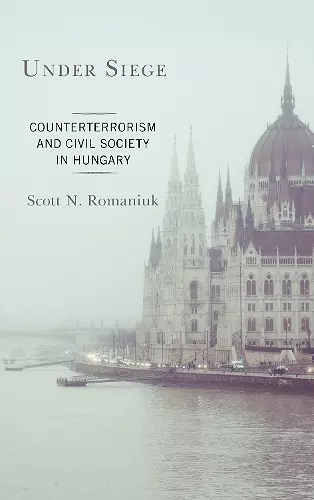Under Siege
Counterterrorism and Civil Society in Hungary
Format:Hardback
Publisher:Bloomsbury Publishing PLC
Published:7th Feb '22
Currently unavailable, and unfortunately no date known when it will be back

Under Siege: Counter-Terrorism and Civil Society in Hungary critically examines the effects of Hungary’s counterterrorism and security policies on civil society organizations since the Fidesz party’s sweeping victory in 2010. It explores the historical and political depths of the government’s security apparatus, including the formation and implementation of its counter-terrorism laws, polices, and institutions, as well as the terrorism landscape. The author draws upon survey research conducted across four categories of civil society organizations, including peacebuilding, development, human rights advocacy, and humanitarianism, and extensive data collected through semi-structured interviews with members of the civil society community, security actors, legal experts, politicians, and scholars. This book argues that the Hungarian government’s counterterrorism and security regime has significantly altered the autonomous space in which civil society organizations operate and severely strained state-society relations.
“Romaniuk's argument about the relationship between domestic counterterrorism policies and the position of civil society organizations is compelling and contributes to our knowledge in this under-theorized area. Well-grounded in primary sources and interviews, he constructs an argument which is generalizable well beyond the Hungarian case. A must-read for scholars of comparative politics and democratization.” -- Mary Manjikian, Regent University
In Under Siege: Counter-Terrorism and Civil Society in Hungary, Scott Romaniuk offers an original theoretical and empirical account of the the role of civil society in Hungary’s counterterrorism policies. Romaniuk provides a very interesting and compelling framework to analyse animportant, and largely under-researched topic going beyond the familiar post-9/11 narratives in a key EU member state from Eastern Europe. As such, this book offers innovative insights on both civil society and Hungary’s counterterrorism policies. -- Christian Kaunert, University of South Wales
Under Siege: Counter-Terrorism and Civil Society in Hungary is an illuminating book for the ongoing debate about the liberty versus security tradeoffs. Governments across the world have capitalized on fear of terrorism to pass sweeping national security measures, often at the expense of human rights and liberties. Scott Romaniuk documents the impact of Hungarian counter-terrorism responses on civil society groups, revealing the enduring negative effects of a politicization and securitization of civil society actors and their activities on liberal democracy. -- Mariya Y. Omelicheva, University of Kansas
Scott N Romaniuk's work sheds light on a number of processes of interest to contemporary scholars of Central-Eastern Europe, terrorism, counter-terrorism, security, securitization, and the role of civil society in democratic development. To those studying democratic backsliding, a case study of the impact of terrorism over-securitization, related counterterrorism measures, and their multilayered motives as well as impacts, "Under Siege: Counterterrorism and Civil Society in Hungary" makes an important contribution to existing scholarship by surveying experiences and perceptions of Hungary's civil society organizations, as well as embedding a discussion of these in an overview of recent institutional developments in the field of domestic security and counterterrorism in Hungary, richly contextualizing the presentation of the policies examined in the book. -- Péter Marton, Corvinus University of Budapest
Dr. Romaniuk has given us an original, insightful, compelling, and detailed dissection of counter-terrorism and civil society in Hungary. He challenges us to engage in critical discussions about human rights abuses, civil rights violations, discrimination, and barefaced repression that are usually meted out under the guise of national security and protection. This book is an essential read for students and scholars interested in terrorism, counter-terrorism governance, the importance of civil society in combatting this scourge, and critical security studies in general. -- W. Andy Knight, Yale University
The book is an excellent example of in-depth and contextual comparative, sociological, and political analysis within the framework of an interpretative paradigm. It also shows in an interesting and precise way the contemporary transformations of civil society in the historical context. The author, through detailed descriptions, interpretations, and references to a wide range of problems of a country largely under-researched, despite being of key importance for Europe. The book gives the reader rich and original insights both on Hungarian anti-terrorist policy as well as maintaining the democratic order in the changing and increasingly difficult political situation in Europe and the world. * Voluntas *
ISBN: 9781498599559
Dimensions: 228mm x 160mm x 33mm
Weight: 717g
362 pages